Diary Of A Restored Typewriter
 The Dealer
The Dealer
1940—fresh off the line. My covers are matt black, and I’ve got shiny chrome trim. Everyone who sees me is excited by my magic margin button. I was delivered, along with several of my brothers, to a dealer in Wisconsin, who sells and repairs office equipment.
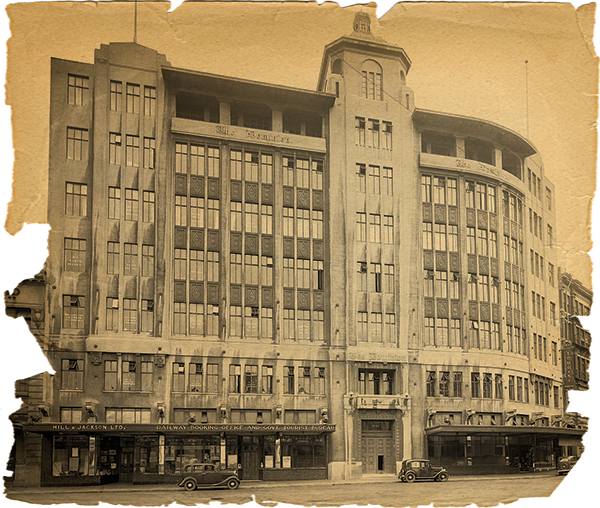 We were all excited when they started to unload us, all of us wondering where we’d be placed—what kind of operator would use us. Offices, I hear, are the best. Secretaries are the most experienced users, so they take care of us. Sometimes we end up in shops, I’ve been told, where the conditions aren’t great for any kind of mechanical machine.
We were all excited when they started to unload us, all of us wondering where we’d be placed—what kind of operator would use us. Offices, I hear, are the best. Secretaries are the most experienced users, so they take care of us. Sometimes we end up in shops, I’ve been told, where the conditions aren’t great for any kind of mechanical machine.
Right now, though, I am the envy of my brothers. I was the first one unpacked, and therefore, the one the decided to use as their floor model, AKA demo unit. Every day, customers come in and the salesman shows off my elegant features to dozens of eager buyers. But the buyers always buy one of my brothers—I continue to be a show-piece. I guess it’s not so bad.
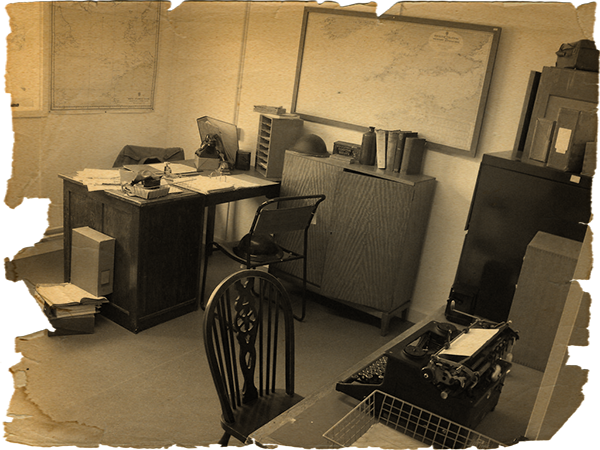 New Owner
New Owner
I’d been the demo unit for my brothers for months now—but our maker has a replacement model, and I now have a special price tag on my cover. One slightly less than all the others because I have been out of the box for so long. I was put in the display shelf with some other models. Some of them are like me (floor models) and some of them are scratch-n-dent typewriters… that is, they have minor defects that make them a little less desirable but more affordable.
I was on the shelf for only two hours, when a young man came and picked me up. He took me to his office, and presented me to his secretary, a pretty, young woman named Betty. She smiled and cheered, and she leaned into him and kissed his cheek. He had to wipe her lipstick off with a hankie. Then they went into another room, and when they returned, he had much more lipstick on his face… this time he used a large towel to wipe it off.
An hour later, Betty used me to type her first invoice for services rendered. It took her a while to get used to all the functions—she had been using a very old Remington for the past two years.
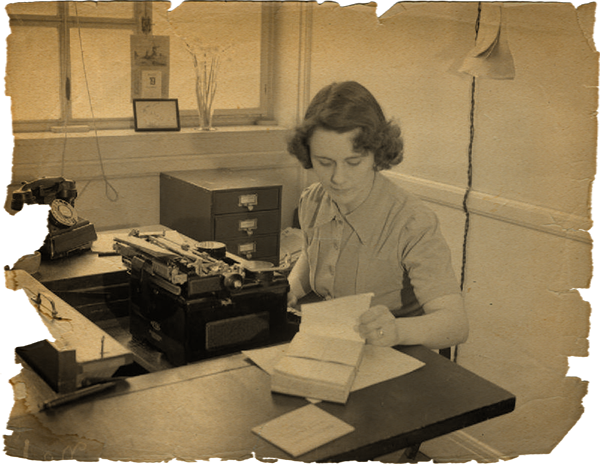 The Grind
The Grind
I get used fairly often. At first, it was for invoices and other forms. Then, it was for letters and dictations. Betty is much faster than she used to be. Sometimes she goes too fast, and several of my strikers try to hit at the same time and they get stuck. She quickly frees them, and then slows down.
I’ve been through 3 ink ribbons now. I’ve had a repair man in once to clean my keys and oil various levers and hinges. Betty is careful to take care of me, and the repair man even said that I was in much better shape than the machines he’s used to seeing.
I’m happy. An unused typewriter is like an unsung song. An overused one is like an over-sung song. Everything is just right for a typewriter in this little office. And Betty and the boss get along fabulously. There’s a good vibe here. I hope to stay for a long time.
 The Auction
The Auction
The boss-man was offered a new job today. I heard him talk about it to Betty. Taking it would mean closing the business, which would mean goodbye Betty and goodbye Royal typewriter. Betty started crying when he told her this, but when he saw that he pulled a small box from his pocket and showed it to her. She smiled then, and pulled a diamond ring from the box and put it on her finger. She kept yelling, “yes, yes, yes” and then they went into the back room together for a while.
The next day, they started packing things up into boxes. I got my own separate box, and was padded with lots of old newspapers. I got carried around and driven around, and finally I ended up on a table with lots of other things from the office.
A man pointed to me and started asking if anyone would give him $25 for me, but no one said yes. Then he asked for $20, 15, 10, and finally $5. A middle-aged man put his hand up and the first bid was in. Another person bid 6, then 7, then 8. The man who’d originally bid 5 now bid 10. It went one, twice, and I was sold, to the middle-aged man in a plaid coat for $10. Not a bad deal, according to the auctioneer, who commented on how well I had been taken care of.
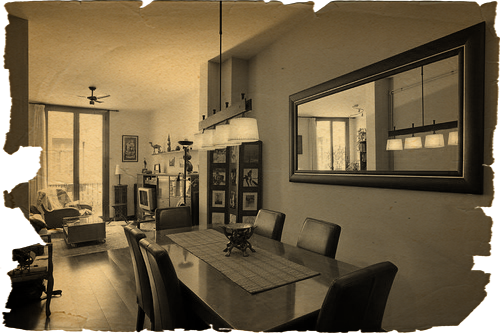 The man in a plaid coat picked me up and walked out the door. He carried me several blocks, until he arrived in an apartment building. We went up three flights of stairs and into a cozy little room. A woman was there sewing a pair of pants, and she looked up and said, “What do you got there, Harvey?”
The man in a plaid coat picked me up and walked out the door. He carried me several blocks, until he arrived in an apartment building. We went up three flights of stairs and into a cozy little room. A woman was there sewing a pair of pants, and she looked up and said, “What do you got there, Harvey?”
“Typewriter,” he said. “I’m finally gonna write that novel.”
The woman smirked, and then turned back to her sewing. “You don’t need a fancy typewriter to write a book. Just pick up a dang pencil and some paper and start writing!”
“We’ll see,” he said, and carried me into a back room.
There was a desk here, with some paper and a pencil and a pen with an inkwell on it. He moved it all aside and put me centered on the desk. Then he left the room.
 A Day Of Writing
A Day Of Writing
Harvey was back today. I’ve been on this desk for almost a month, and I’m beginning to collect a layer of dust… much like the other writing utensils. He came in and sat at the chair in front of my desk. He put a single sheet of clean paper in me and typed out, “The Murderous Neighbor, By Harvey Gestetner.” Then he removed that and set it on the desk and put another clean sheet in.
We sat there, the two of us, for a long time and he did nothing. He put his fingers on one of my keys, and I thought he was going to start, but he stopped and put his hands back on his lap. He lit a cigar, leaned back in his chair, and blew smoke into the air above me. Then he blew another cloud right at me. He cracked his knuckles and then put them on my keys again. Finally, he typed:
“I can’t say I thought too much of him, the first time I met him. He was moving in. I was his neighbor. It seemed fitting for me to walk across the adjoining yards ag and introduce myself. At the mention of my name, he grove gave me a wry look and frowned. His large frame shifted from one foot to the other, and he spit in the grass and told me to get off his lawn.”
Then Harvey stopped writing and scrolled the paper up so he could read it. He grunted a little, nodded, and then scrolled the paper back down so it would start at the next paragraph. He sat there for another long period before his wife called from in the other room. He stood up and left, closing the door behind him.
 Changes Coming
Changes Coming
Harvey and his wife were both in today. Harvey had not written anything since that first session. In fact he hadn’t even seen me since then. But today, they both came in and walked around the edges of the room, sometimes measuring corners and wall lengths.
His wife said, “This should be fine for him.”
Harvey mumbled something intelligible and then said, “So much for having my own study.”
“You hardly even come in here,” she said and laughed.
“Still,” he said, “I was planning on doing some writing soon… as soon as I had time. I still plan on it. Your dad can move in here, but I’m keeping the desk here and if I want to come in and write something, I’m doing it whether he’s here on not. It’s my room—I pay the rent. I go where I want when I want.”
“I’m sure he’ll be fine with that,” she said. “Come on—we have to unload his stuff.”
Then they brought in a bed and a chair, and then clothing, some of which was laid on top of me. Hidden under a shirt, the rest of the evening was blocked from me. I heard them bring in many more things, and I think more of that was put over me. I was being buried.
Later that night, I got a brief glimpse of light when an old man picked up the clothing and either put it in drawers or hanged it up. He looked at me, and noticed Harvey’s single paragraph still in my grips. He rolled forward a couple of lines and read. He walked away chuckling.
Later, as he was preparing for bed, the old man took an empty box and turned it upside down on top of me. I could hear him putting things on top of the box, and I knew I was being buried again.
Storage
It’s been years since I was put under the old man’s box. Today, someone took the box off. In didn’t recognize the man. He looked at me and then yelled over his shoulder, “Hey this is a pretty nice typewriter.”
From another room, I heard Harvey say, “Oh, I forgot I had that. Go ahead and put it with the other stuff for now. I’ll get it back out after the move. I want to set it up in my new study.
 Auction Again
Auction Again
I stayed in the dark storage bin for decades. It was dry, so I acquired very little rust. But today, several young men pulled me and everything else in the storage area out and carried us to a truck (such a weirdly designed truck). I was stacked carefully, and then driven to another place. A large sign on the front of the building read “GOODWILL.” We were all unloaded there, and a woman named Patti picked through all of the junk, usually writing numbers on it, and putting it into a large cart.
Out of everything from storage, I was the only thing not put into the cart. A man came and pushed the cart away, and that was the last time I saw all the things I’d been with in storage.
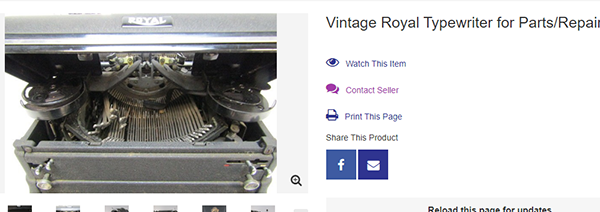 Patti pressed a couple of my keys and buttons, and played with the magic margin mechanism. All of my joints were stiff, because I’m 80 years old and I haven’t been used in close to sixty. The keys she pressed forced the strikers up properly, but they stuck and she had to put them back down by hand. My platen didn’t advance at all. She fingered my ink ribbon, but couldn’t move it. She blew into me and dust and cobwebs went flying everywhere. She took some pictures of me (such an odd looking camera), and then packed me into a box with lots of something called bubble wrap.
Patti pressed a couple of my keys and buttons, and played with the magic margin mechanism. All of my joints were stiff, because I’m 80 years old and I haven’t been used in close to sixty. The keys she pressed forced the strikers up properly, but they stuck and she had to put them back down by hand. My platen didn’t advance at all. She fingered my ink ribbon, but couldn’t move it. She blew into me and dust and cobwebs went flying everywhere. She took some pictures of me (such an odd looking camera), and then packed me into a box with lots of something called bubble wrap.
I heard her say, “Jasper, set this up for the online auction. It don’t work at all. Start the bidding at ten bucks.”
 A New Owner
A New Owner
I was let out of my bubble wrap today. A man used a knife to cut it all away, and then carefully pulled me free from it and set it on a workbench. He fingered a few things, the way Patti had, and then sighed. He lit a cigarette, sighed again, and said, “Well, let’s get started.”
With a brush, he slowly and meticulously cleared away all the cobwebs and dust. Sometimes, he would inhale deeply, and then blow. Sometimes, he would pick up an air nozzle attached to a hose, and use it to squirt very strong wind into me. The air nozzle was much more powerful than his lungs. I was afraid some of my springs would fly loose. But none did.
Once the dust was cleared away, he pressed a single key. My striker begrudgingly left its position and smacked into my platen and stayed there. He grasped the striker between his thumb and forefinger, and began moving it back and forth. Meanwhile, with his other hand, he put a drop of oil at each of the hinging/moving sections between my striker, all the way beck to my key. Then he used a rag to clean each section, polishing, and slowly wiping away the thin layer of rust. At last, he fingered the key again, and my striker flew up against my platen effortlessly, and then quietly sank back to its original position, without any help from him.
He did this with each of my 42 character keys.
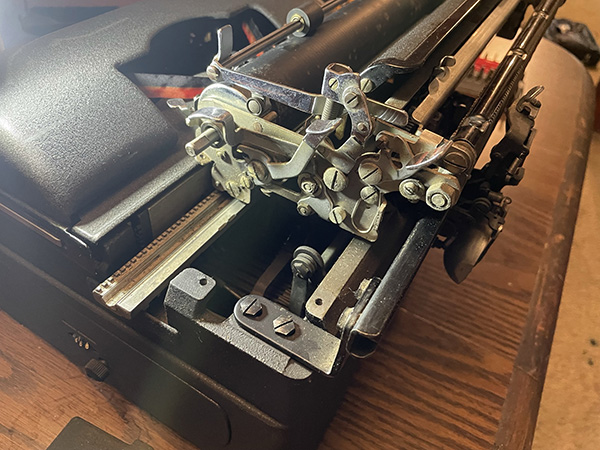 Then he went to work similarly on my shift, margin, and tab keys. When he was satisfied that all of the keys were mechanically sound, he turned his attention to the carriage/platen movement.
Then he went to work similarly on my shift, margin, and tab keys. When he was satisfied that all of the keys were mechanically sound, he turned his attention to the carriage/platen movement.
There are many moving parts involved in forcing my platen to move back and forth, and the man studied each of them, moving them with his finger or a springhook, and oiling wherever it was suitable. Eventually, the platen started to move—but not as easily as it once did.
 Then he grabbed his screwdriver and started taking my covers off. One by one, he took them off and lined them up on the workbench next to me, putting all the screws in a magnetic dish. There were so many different screws—I prayed he would not get them mixed up, but he seemed to know what he was doing.
Then he grabbed his screwdriver and started taking my covers off. One by one, he took them off and lined them up on the workbench next to me, putting all the screws in a magnetic dish. There were so many different screws—I prayed he would not get them mixed up, but he seemed to know what he was doing.
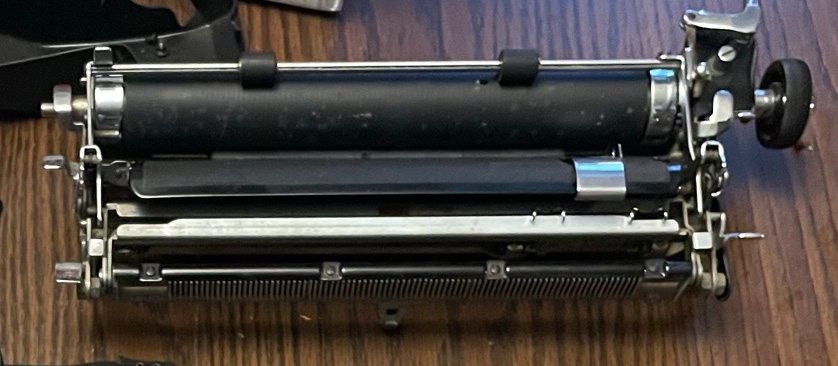 Then he took the drawback strap loose from my platen, and secured it to my frame. A few more screws, a couple of brackets, and he had my entire platen carriage in his hand. He turned it over, moved each part of it, and oiled each part. He wiped the platen surface with something called ‘rubber rejuvenator.’ As he put it down, he said (he actually talked directly to me), “It’s a little dry, but I think you’d be better off keeping the original. Recoating it now would decrease your value.”
Then he took the drawback strap loose from my platen, and secured it to my frame. A few more screws, a couple of brackets, and he had my entire platen carriage in his hand. He turned it over, moved each part of it, and oiled each part. He wiped the platen surface with something called ‘rubber rejuvenator.’ As he put it down, he said (he actually talked directly to me), “It’s a little dry, but I think you’d be better off keeping the original. Recoating it now would decrease your value.”
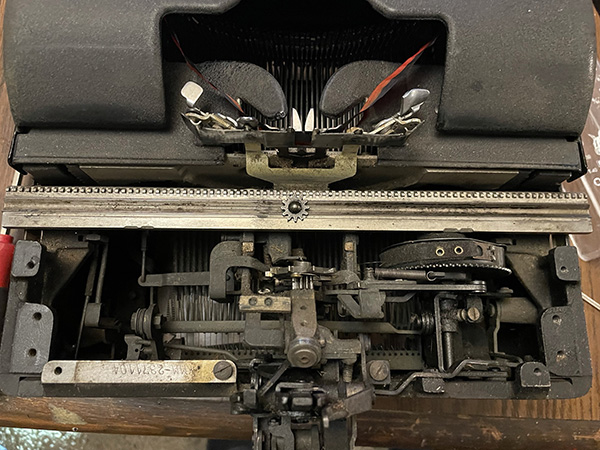 He unhooked my drawback strap completely and put it in a plastic bag. “This works,” he said, “but we’ll put a new one in. That way, the original won’t get any more worn.” He installed a piece of what he called ‘sixty pound test line’ in its place, and rewound the spring (oiling as he went along).
He unhooked my drawback strap completely and put it in a plastic bag. “This works,” he said, “but we’ll put a new one in. That way, the original won’t get any more worn.” He installed a piece of what he called ‘sixty pound test line’ in its place, and rewound the spring (oiling as he went along).
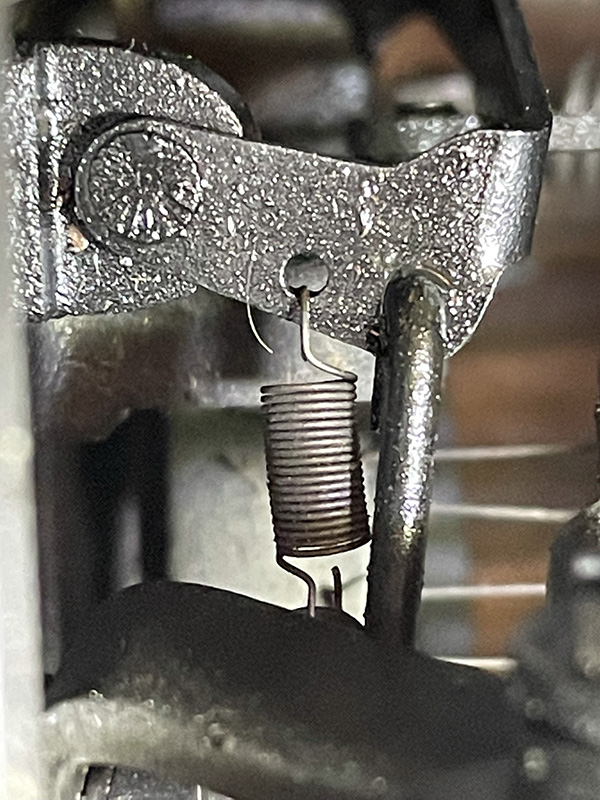 For a long time, he fiddled with the key stopper. It’s the feature that keeps a user from striking any more keys once my platen carriage has reached a margin. It worked, but it would stick, and then even after my carriage was moved, the keys wouldn’t move the strikers. Finally, he said, “Ah, here’s the culprit. This spring is just a little too weak.”
For a long time, he fiddled with the key stopper. It’s the feature that keeps a user from striking any more keys once my platen carriage has reached a margin. It worked, but it would stick, and then even after my carriage was moved, the keys wouldn’t move the strikers. Finally, he said, “Ah, here’s the culprit. This spring is just a little too weak.”
He searched through a giant box of springs until he found one he was satisfied with, and replaced my key stopped release spring. He put the original spring in the bag with the drawback band. He tested it without putting me back together, then smiled, and went to work on my ribbon advance.
I was able to advance the ribbon in one direction. If he manually switched the direction, I could advance the ribbon the other way as well. But I wasn’t able make the direction switch automatically by itself. Again, a weak spring. Again, he replaced it, and bagged the original.
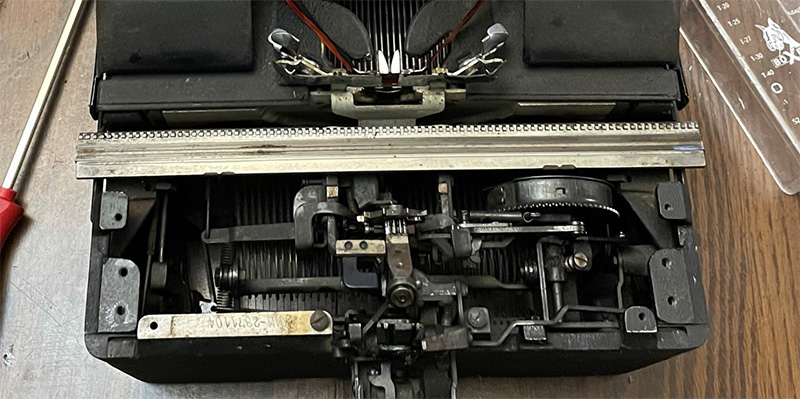 He worked his way through every mechanism under my platen, cleaning, oiling, checking, adjusting.
He worked his way through every mechanism under my platen, cleaning, oiling, checking, adjusting.
When he was satisfied, he brushed everything a final time and blew out remaining dust. Then, one piece at a time, I was reassembled. Each time something was attached, all the functions were checked again before moving on to the next component or panel.
Once everything was attached, he poured something onto a rag, and then wiped all outside surfaces with it. My platen, my covers, my keys. I could feel years of dirt and grease disappearing.
Without dirt, I noticed my covers had lost all of their luster. They looked dusty, almost. I wondered if he would paint me. I’d heard of such things. Instead, he poured something else onto a rag, and wiped me down with that, making small circular motions.
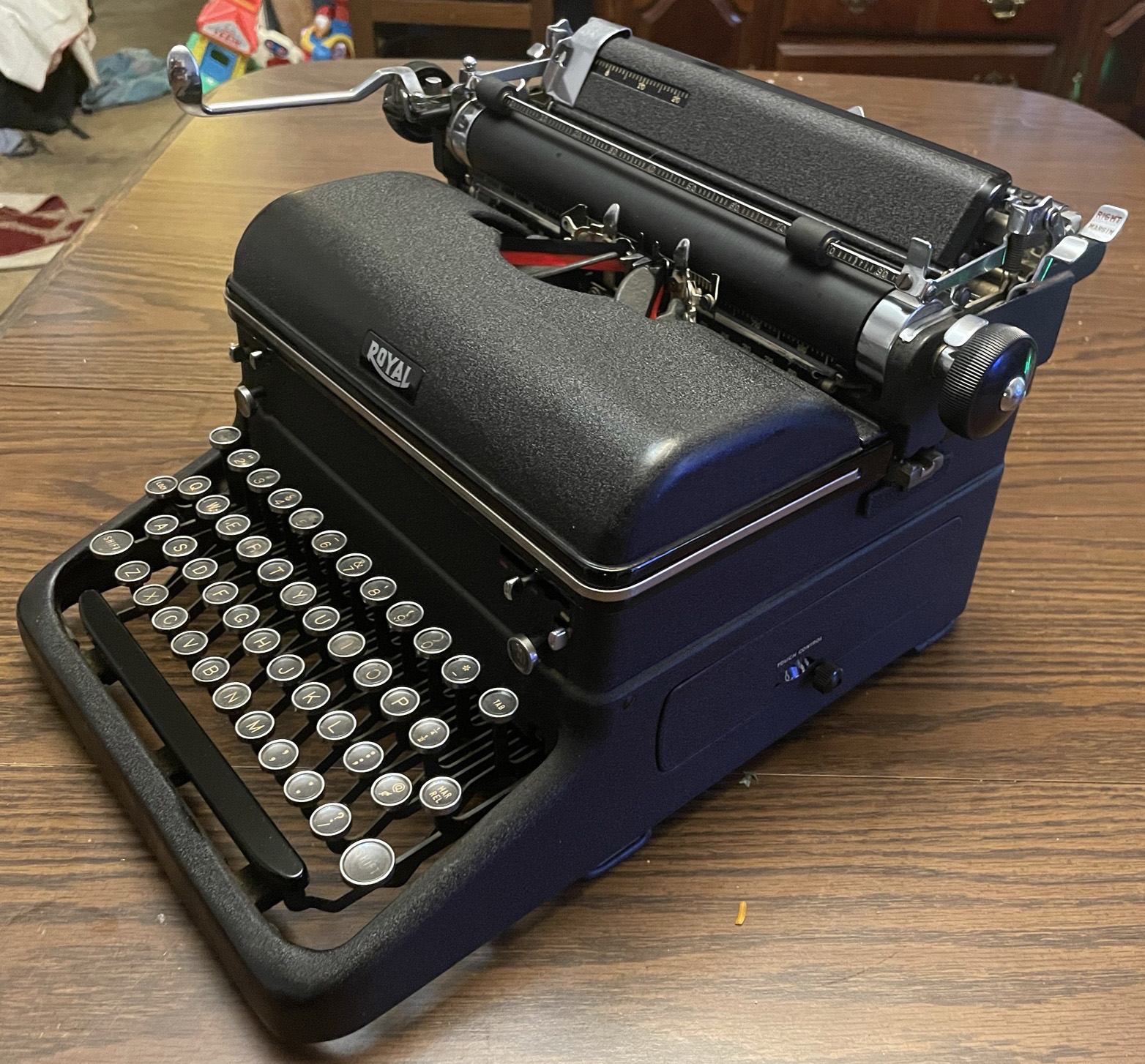 He put me under a lamp and examined my exterior. I could actually feel the glow from the lamp reflecting from my beautiful covers.
He put me under a lamp and examined my exterior. I could actually feel the glow from the lamp reflecting from my beautiful covers.
He put a fresh piece of paper in my platen and typed out the words, “the quick brown fox jumps over the lazy dog.” Then he locked my shift down and typed it again.
He wrote it all in red ink from the fresh ribbon he’d installed. Then he tested each of my number and each of my punctuation mark keys.
All of these things took approximately 17 hours, split up between several days. I write it as a single event, for the sake of brevity. But it’s obvious the man is committed to my mechanical integrity, as well as aesthetics. All my parts move freely and easily—as they did when I was first put on the showroom floor in Wisconsin.
He put me on a shelf with several other typewriters. I was the only Royal KKM Magic Margin model. I saw some that were older than me. I saw many that were much younger. Some of them, I was told, ran on electricity. But we were all polished and working properly.
He put a small sign on me that read:
Cincinnati Repair
Royal KKM Magic Margin
$430
I wonder where I’ll go from here, and if my next operator will be anything like Betty, Harvey, or the man who fixed me.



